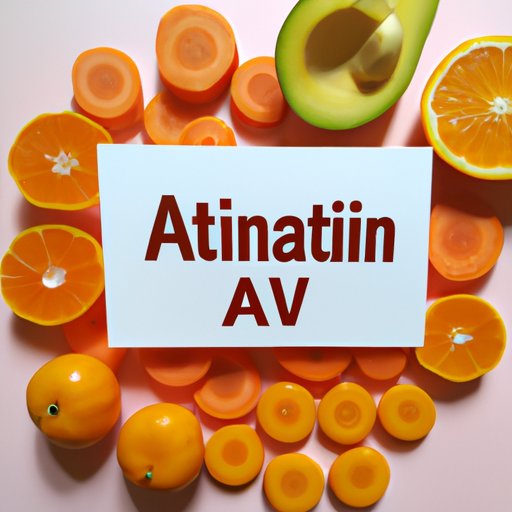
Introduction
Vitamins are essential nutrients that our bodies require to carry out various functions efficiently. Vitamin A is a vital nutrient that helps in the promotion of good vision, immune function, and healthy skin. However, not many people know that there is another form of vitamin A called provitamin A, which is equally important. In this article, we will explore what provitamin A is and its importance in maintaining good health.
What is Provitamin A?
Provitamin A is a term used to describe a group of organic compounds that are converted into active vitamin A in the body. These compounds are also referred to as carotenoids, which are pigments found in plants and foods. Unlike true vitamin A, which is obtained directly from animal sources, provitamin A is obtained from plant-based food sources. In the body, provitamin A is converted to retinol, the active form of vitamin A, which is essential for healthy vision, immune system function, and skin health.
Examples of some common provitamin A carotenoids include alpha-carotene, beta-carotene, and beta-cryptoxanthin. These carotenoids are found in various fruits, vegetables, and other plant foods. For instance, beta-carotene is abundant in sweet potatoes, carrots, and spinach, while alpha-carotene is common in pumpkin, carrots, and winter squash. On the other hand, beta-cryptoxanthin is abundant in peppers, oranges, and papayas.
Why Provitamin A Matters
Vitamin A is essential for good health, and provitamin A plays a crucial role in ensuring adequate intake and utilization of this vital nutrient in the body. Vitamin A is critical for good vision, immune function, healthy skin, and reproduction. It helps to maintain epithelial tissues’ integrity, including the skin, respiratory, and intestinal tract lining, which form a crucial barrier against infections and harmful substances.
Provitamin A is essential as our bodies cannot produce vitamin A on their own. Instead, the body must convert provitamin A into vitamin A, making their adequate intake crucial. The conversion rate of provitamin A carotenoids to vitamin A depends on various factors like gut health, the presence of bile, and other dietary components like fat, among others.
Some of the health benefits associated with adequate vitamin A intake/provitamin A include:
- Promotes good eye health and prevents night blindness and other vision impairments.
- Boosts immune function and protects against infections.
- Keeps the skin healthy and ensures proper wound healing.
- Regulates growth and development, especially in children and infants.
How to Get Enough Provitamin A
Provitamin A can be obtained from various foods, especially plant-based ones. Eating a varied and balanced diet rich in different food groups can help ensure an adequate intake of provitamin A. The following are some of the best food sources of provitamin A:
- Sweet potatoes
- Carrots
- Pumpkin
- Spinach
- Winter squash
- Kale
- Apricots
- Mangoes
- Cantaloupe melon
It’s essential to note that provitamin A sources vary in their potency and availability in the body. For instance, beta-carotene is more effectively converted to vitamin A than other carotenoids. Additionally, cooking, processing, and other factors may alter the bioavailability of provitamin A in foods, making it essential to vary food sources and preparation methods.
Exploring the Benefits of Provitamin A
While vitamin A is essential for good health, the specific benefits of provitamin A vary depending on the specific type of carotenoid. For instance, beta-carotene has been shown to have significant antioxidant properties, which help protect the body from oxidative stress and damage. Additionally, beta-cryptoxanthin has been associated with lower inflammatory markers and a reduced risk of certain chronic diseases like lung cancer.
The beneficial effects of provitamin A are not limited to those explicitly linked to vitamin A. Including a variety of plant-based foods in the diet, rich in different provitamin A types, can offer numerous health benefits like reducing the risk of chronic diseases like cardiovascular disease, diabetes, and certain cancers.
Provitamin A and Your Health
Vitamin A deficiency is a significant public health concern, especially in areas of the world where malnutrition and food insecurity are prevalent. Deficiency in vitamin A can cause night blindness, impaired immunity, and poor skin health, among other complications. Incorporating provitamin A-rich foods in the diet can help prevent vitamin A deficiency, especially in at-risk populations like children, pregnant women, and lactating mothers.
It’s essential to note that provitamin A intake should be part of an overall balanced diet, and excessive supplementation can lead to toxicity and adverse effects. Adhering to established dietary guidelines, including recommended daily intake levels, can help prevent adverse effects.
Conclusion
Provitamin A is a crucial nutrient that plays a vital role in ensuring adequate vitamin A intake and utilization in the body. A balanced diet rich in various food sources is essential in ensuring adequate intake of different provitamin A types for optimal health benefits. From promoting good vision and healthy skin to protecting against infections and chronic diseases, provitamin A-rich foods should not be overlooked in the diet. To ensure a healthy and enjoyable life, it’s essential to eat a varied and balanced diet that includes different food groups, including those rich in provitamin A.





